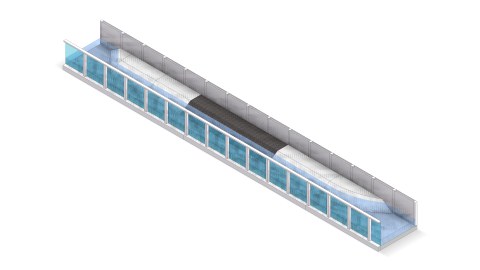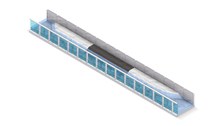Data- and risk-based development of innovative construction methods for climate-adapted transport infrastructure
Table of contents
Brief description
Motivation
Climate change is a reality and causes weather-related natural disasters as a result of heavy rainfall and flash floods, floods, storms, droughts and heat. In the future, the risk situation for localized heavy rainfall events combined with flooding is also expected to intensify, which, depending on the topography and surface conditions, will lead to heavy surface runoff with high hydraulic loads (flooding, overflowing, undercutting, scouring, etc.) on the road infrastructure. In the context of risk management, the usability of transport infrastructure before, during and after a flood or heavy rainfall event also plays a major role for society as a whole (e.g. ensuring supply and evacuation routes in the event of an incident). This is reflected in the concrete resilience of transport infrastructure to natural events in terms of its ability to withstand or adapt to certain impacts or to regenerate quickly in the aftermath.
Objectives and methodology
The Pave4Climate project aims to develop methods and measures for the construction and maintenance of climate-resilient road infrastructure. The focus is on risk-based adaptation measures to extreme weather events caused by climate change, such as flooding and heat. By identifying cause-and-effect chains, climate-adapted upgrading measures are derived and risk-based prioritized road sections are identified for adaptation measures. The project is based on the current state of research and uses laboratory experiments, simulations and artificial intelligence to investigate complex cause-and-effect chains of flood damage. In addition, innovative building materials and construction methods are being developed that not only minimize the effects of heavy rainfall and flooding, but also withstand rising temperatures as a result of climate change. The project takes into account the influence of climate change on natural disasters and emphasizes the importance of the resilience of transport infrastructure.
Sub-objectives
- Compiling damage information on different road superstructures as a result of hydraulic and thermal loads
- Assessing the susceptibility to damage of different road structures in physical laboratory tests for the relevant hydraulically induced damage processes
- Identification of damage mechanisms and evaluation of erosion resistance in the event of flow attack on road construction materials
- Risk assessment for cases of damage to road infrastructure, taking into account a superordinate cause-and-effect model
- Development and application of semantic digital models and detection of road infrastructure with increased risk of damage using AI techniques
- Design and evaluation of temperature-adapted asphalts and construction methods, identification of temperature-related critical stress conditions in concrete pavements
- Evaluation of road structures with regard to their load-bearing capacity at high water contents
- Dimensioning proposals for climate-adaptive and resilient road infrastructures; recommendations for the selection of construction materials and construction material mixtures
Media

© Die Autobahn GmbH

© R. Reboucas
© R. Reboucas
Project data
|
Core information |
|
|
Project period |
06/2024 - 05/2027 |
|
Type of funding |
Third-party funding |
|
Funding body |
Federal Highway Research Institute (BASt) |
|
TUD Research Priority Areas |
Energy, Mobility and Environment ' Water Research |
|
Sustainable Development Goals (SDGs) |
SDG 6 - Clean water and sanitation SDG 9 - Industry, innovation and infrastructure SDG 11 - Sustainable cities and communities SDG 13 - Climate action SDG 17 - Partnerships to achieve the goals |
|
Keywords |
Climate resilience, transport infrastructure, model development |
Project management
 © Andrè Terpe
© Andrè Terpe
Professor
NameMr Prof. Dr.-Ing. Jürgen Stamm
Head of Inst., Chair Hyd. Eng. & School of Civ. & Environ. Eng.
Send encrypted email via the SecureMail portal (for TUD external users only).
Office of the Chair of Hydraulic Engineering
Visiting address:
Beyer-Bau, Room 04-22 George-Bähr-Str. 1
01069 Dresden
Office hours:
Appointments only by prior arrangement (phone or email)
Project management

Research Associate
NameMr Dr.-Ing. Ulf Helbig
Head of Hubert Engels Laboratory
Send encrypted email via the SecureMail portal (for TUD external users only).
Office of the Chair of Hydraulic Engineering
Visiting address:
Beyer-Bau, Room 04-023 George-Bähr-Str. 1
01069 Dresden
https://orcid.org/0000-0002-8659-9100
Office hours:
Please arrange a specific appointment in advance by e-mail.
 © Gabriela Nande
© Gabriela Nande
Research Associate
NameMs Alejandra Gabriela Orozco Nande M.Sc.
Send encrypted email via the SecureMail portal (for TUD external users only).
Chair of Hydraulic Engineering Secretariat
Besucheradresse:
Beyer-Bau, Raum 139A George-Bähr-Str. 1
01069 Dresden
Deutschland
 © Ringo Reboucas
© Ringo Reboucas
Research Associate
NameMr Ringo Rocha Reboucas M.Sc.
Send encrypted email via the SecureMail portal (for TUD external users only).
Chair of Hydraulic Engineering Secretariat
Visiting address:
Beyer-Bau, Raum 136 George-Bähr-Str. 1
01069 Dresden
Office hours:
Please arrange a specific appointment in advance by e-mail.
Project partners
|
Partner:in |
Type |
Website |
|
Institute of Urban and Pavement Engineering (ISS), TUD |
Internal |
https://tu-dresden.de/bu/bauingenieurwesen/isb |
Publications
-
Further information
Emergency action plan "Flood, heavy rain and temperature events"
Funding
The research project FE 88.0180/2023/IE01 is funded by the Federal Highway Research Institute on behalf of the Federal Ministry of Digital and Transport Affairs. Responsibility for the content lies solely with the author.
Data protection
As part of the project, data sets from the Saxon State Ministry of Infrastructure and Regional Development on the 2021 flood event in the Free State of Saxony are evaluated. The aim is to scientifically analyze the damage caused and to derive findings for a more resilient transport infrastructure. The data is processed in strict compliance with data protection regulations. A specially created privacy policy regulates the handling of the information. Access is reserved exclusively for the project partners involved and is limited to scientific work within the framework of Pave4Climate.





